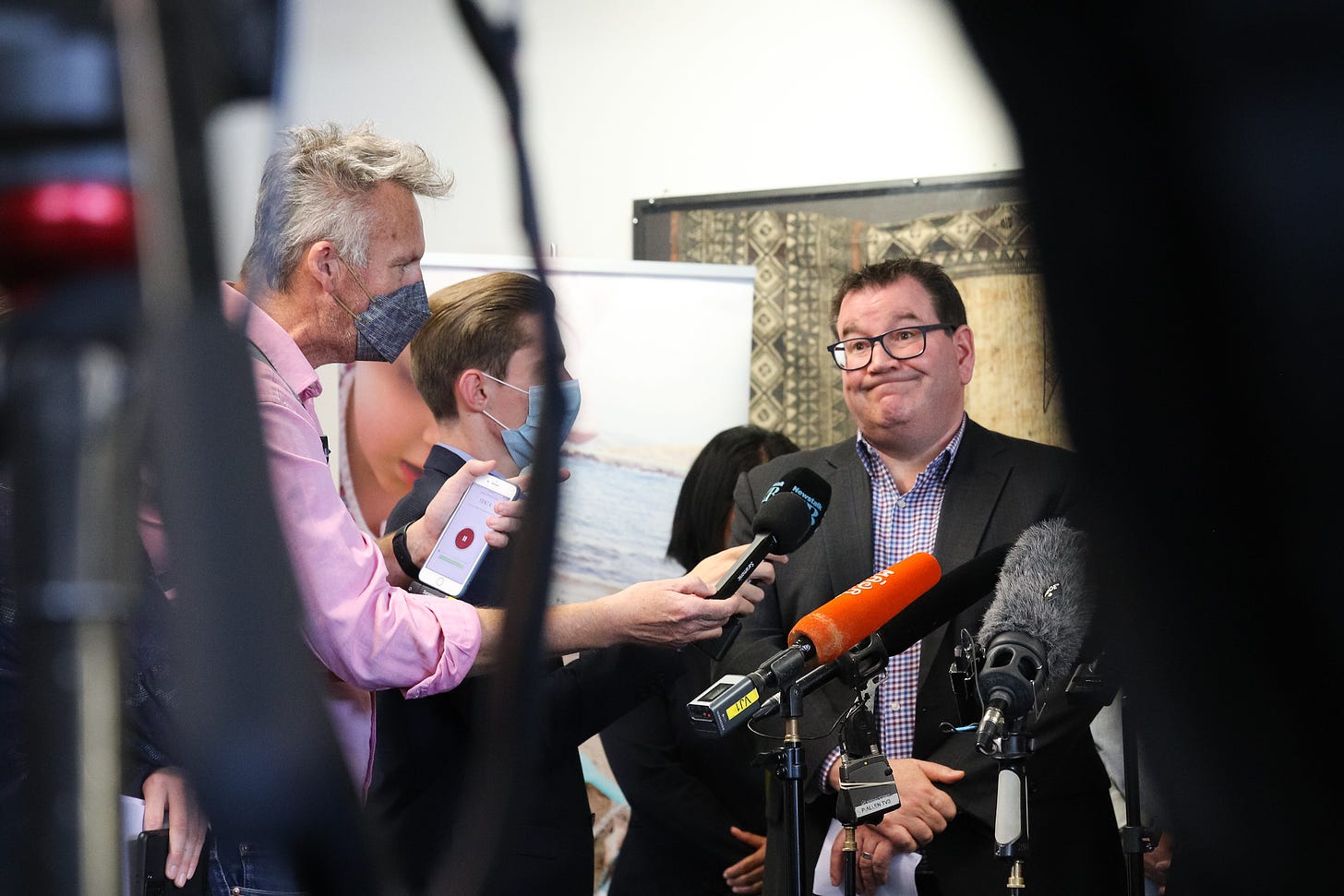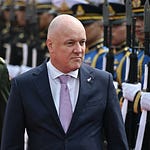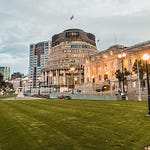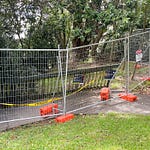TLDR: The podcast above is a recording of our Friday evening live ‘hoon’ webinar with myself, Peter Bale and Professor Robert Patman talking about the events of the week that was for almost 100 paid subscribers to The Kākā. I send an invite to paid subscribers on Friday afternoons.
This week:
the Labour Government pushed ahead with a tweaked version of Three Waters over the top of council objections;
Revenue Minister David Parker proposed a new tax principles law to ensure only fair tax changes, creating the potential for another wealth tax debate at next year’s election;
the Reserve Bank put off launching a new debt to income multiple tool so far into next year it’s unlikely before the election (and therefore unlikely at all);
the US Federal Reserve is set to almost quadruple its key cash rate inside 90 days to control inflation, but may instead over-tighten and deepen a US recession next year; and,
Britain and the United States ramped up their rhetoric about beating Russia militarily and sent extra supplies of heavy weapons for Ukraine this week, which Vladimir Putin warned could trigger a ‘lightening-fast’ Russian military response against NATO (seen as him again hinting Russia might use nuclear weapons).
Labour persists with Three Waters
Finance and Infrastructure Minister Grant Robertson and Local Government Minister Nanaia Mahuta announced on Friday the Labour Government had decided to proceed with its Three Waters reforms despite the protests of councils governing the water assets for about half the motu’s population. Responding to the report of a working group set up by the Government, Cabinet agreed to various tweaks that made privatisation less possible and emphasised that the ‘co-governance’ Regional Representative Groups that will include council and iwi representatives won’t have any day-to-day control over the separate merit-based boards of the four new water entities.
But the changes didn’t placate anyone, least of all the Opposition. ACT and National said they would repeal the changes. They’ll have an opportunity if they win the election next year because the necessary two pieces of legislation won’t both be through Parliament before the next election.
Auckland Council and a group of councils under the Communities for Local Democracy remain opposed to the changes, which they say take away their water assets and remove their ability to control them. Some also fear co-governance. Their opposition doesn’t matter technically as Labour can simply use its majority in Parliament to pass any legislation creating the new water bodies that include the assets. But the overwhelming opposition at both a local and national level has added to the wider political pressure on Labour that now sees it behind National in the polls. It risks becoming the focal point in local election wipeouts for Labour later this year and a niggling source of opposition in the key provincial electorates next year.
All about finding room for $4b-plus of new borrowing
In my view, everyone is missing the point of why the Government is pursuing Three Waters and therefore missing some of the underlying problems. The Government and many councils know that more than $100b needs to be borrowed and spent in fresh investments and making up for past under-investments over the next decade or two. That is simply to provide drinkable water for the existing population and stop the most egregious of storm and sewerage releases into rivers, lakes and beaches. Even more will be needed to re-engineer the biggest cities to deal with climate change and cater for continual (and apparently unplanned) population growth.
Three Waters is all about extracting water assets from councils and organising them into entities that can charge for water. Those revenues are much easier for ratings agencies to see and be confident will be there to service debt against the assets. That will effectively allow much higher borrowing by councils and the Government, but without having to either ask ratepayers’ permission to borrow or charge for water. Only Auckland, Tauranga and Kapiti Coast charge for water at the moment.
Higher debt, water charges without political contests
The Government has said it expects the new entities will allow those water assets to be able to sustain six to eight times their current borrowing. The Government hasn’t said exactly how much that could be, but LGFA estimated there would be $5.5b of council debt against those water assets by mid 2024 when the entities are due to be up and running. That implies up to $44b in borrowing in total, or an extra $38.5b.
The convenient thing for the Government is this debt is not counted as core Crown debt under its own made up debt limit rules, even though it is effectively guaranteed by the Crown.
Three Waters is a vehicle for the Government to do the necessary borrowing and impose the necessary charges in a way that complies with its own debt rules and avoids debates with ratepayers and taxpayers about those higher debts and water charges. In many ways, the non-debates over co-governance and privatisation (neither of which were real threats) have been the perfect distractions for both the councils and Government.
I’ll publish a more detailed analysis and podcast on Monday on Three Waters, including my questions and answers to Robertson and Mahuta on Friday.
A speech about tax fairness without a wealth tax. Yet.
Revenue Minister David Parker gave a thoughtful speech about tax and fairness this week. I published this analysis on Wednesday.
DTI limit increasingly unlikely before the next election
The Reserve Bank indicated this week in releasing feedback on debt to income multiple proposals that it would not be introducing any new DTI restrictions until after mid-2023 at the earliest. That would leave the way clear for any controls to be delayed until after the election, which may please a Government that has been reluctant to introduce them.
The previous National Government refused to allow the Reserve Bank to introduce them in 2017. Labour has agreed to their potential use, but has not signed off their final use.
The Reserve Bank also said it had no plans for now to introduce a formal interest rate serviceability measure for banks to use. They currently use a collection of rates, not all of which are disclosed.
150 basis points of hikes in 90 days
Financial markets are now pricing in three 50 basis point hikes in a row by the US Federal Reserve by the end of July. That would be an effective quadrupling of the world’s key interest rate and the fastest tightening of monetary policy in recent history.
I argued in my Friday morning Dawn Chorus an over-tightening that leads to falling interest rates late next year, along with no DTIs and the growing likelihood of a National election win late next year, creates the conditions for a rebound in house through late 2023 and early 2024.
The rhetoric and heavy weapons deliveries are ramping up
It would be a mistake to think the war in Ukraine has settled into some sort of stability. The rhetoric between NATO and Russia ramped up to new higher levels this week, along with all sorts of weapons deliveries and retaliatory actions. The list of escalations included:
Britain said it would be ok if its missiles were used by Ukraine to strike inside Russia;
there were more Ukrainian strikes and mysterious explosions inside Russia;
Germany decided to send anti-aircraft tanks to Russia, ending months of being reluctant to provoke Russia by sending heavy weapons;
The United States delivered howitzers to Ukraine and began training Ukrainians to use them;
US President Joe Biden asked Congress for US$33b in funds for weapons and aid for Ukraine, preparing for a long and heavy proxy war between a NATO-supplied Ukraine and Russia;
Britain pledged to drive Russia out of Ukraine completely and called for NATO to play a role in defending Taiwan;
Russia cut off gas to Poland and Bulgaria, while the European Union is expected to announce in the next week or two it will cut off Russian oil later this year; and,
Vladimir Putin warned NATO any further threats to Russia would trigger a ‘lightening fast’ military reaction.
So what? - Any direct clashes between NATO forces and Russia could be explosive. The hardening oil and gas sanctions will further escalate energy costs globally. The higher the NATO vs Russia tensions, the higher the risk that China is somehow pulled into the conflagration.
We talked with University of Otago’s Professor Robert Patman in the podcast above.


















The week that was for the week's end